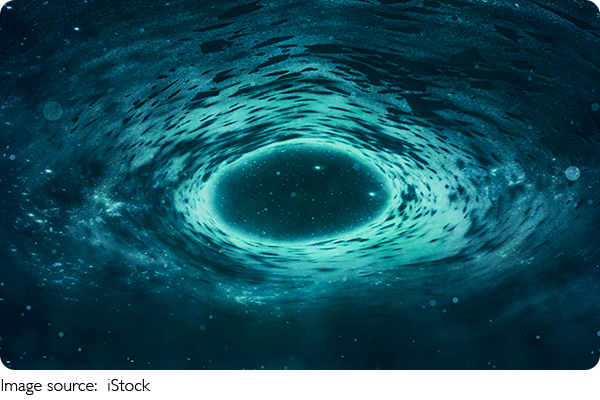Black Holes Unveiled

The universe is full of wonders, but some phenomena are so strange and elusive that they challenge our understanding of the laws of physics. Two of the most intriguing and mysterious phenomena are black holes and gravitational waves.
These cosmic wonders have captivated the imagination of scientists and the public alike for decades. But what exactly are black holes and gravitational waves, and why are they so important for our understanding of the universe?
Let's dive in and explore the mysteries of these incredible cosmic phenomena.
What Are Black Holes?
Black holes are regions in space where the gravitational pull is so strong that not even light can escape from them. This makes them invisible to the unaided eye, but their presence can be detected by observing their effects on nearby matter. Black holes form when massive stars collapse under their own gravity at the end of their life cycle. The result is an incredibly dense point in space known as the singularity, surrounded by the event horizon, which is the point beyond which nothing, not even light, can escape.
There are different types of black holes, but the most well-known are stellar black holes, which form from the collapse of massive stars. Supermassive black holes, found at the centers of most galaxies—including our own Milky Way—are even more mysterious. These can contain millions or even billions of times the mass of our Sun.
The discovery of black holes has revolutionized our understanding of space, time, and gravity. They challenge our basic notions of what's possible in the universe, and they provide valuable insights into the extreme conditions of space. But black holes are more than just theoretical curiosities—they play a critical role in the formation and evolution of galaxies and stars.
Gravitational Waves: The Ripples of Space-Time
Gravitational waves are another mind-boggling discovery that has opened a new chapter in our understanding of the universe. These waves are ripples in the fabric of space-time, caused by the acceleration of massive objects, such as when two black holes collide and merge. When these cosmic events occur, they send out ripples that spread across the universe at the speed of light.
The concept of gravitational waves was first predicted by Albert Einstein in 1915, as part of his general theory of relativity. Einstein's equations suggested that massive objects could distort space-time itself, creating waves that propagate through the cosmos. However, it wasn't until 2015 that scientists at the Laser Interferometer Gravitational-Wave Observatory (LIGO) detected these waves for the first time, confirming Einstein's prediction and opening up a new way of observing the universe.
Gravitational waves provide a unique opportunity to study some of the most violent and energetic events in the universe, such as the mergers of black holes and neutron stars. By detecting these waves, scientists can gather information about the properties of these cosmic objects and events that would otherwise be impossible to observe with traditional telescopes.
The Connection Between Black Holes and Gravitational Waves
Black holes and gravitational waves are deeply connected. In fact, many of the gravitational waves we detect originate from black hole mergers. When two black holes spiral towards each other and eventually collide, the resulting release of energy creates gravitational waves that travel across the universe. These waves are not just a byproduct of the collision—they are a direct result of the intense gravitational forces at play when black holes interact.
The discovery of gravitational waves from black hole mergers has provided scientists with a new way to study black holes and the nature of space-time itself. By analyzing the frequency, amplitude, and shape of the gravitational waves, scientists can learn about the masses, spins, and other properties of the black holes involved in the merger. This allows for a deeper understanding of the dynamics of black hole collisions and the extreme physics that occur in these violent events.
Why Are Black Holes and Gravitational Waves Important?
The study of black holes and gravitational waves is crucial for several reasons. First, it helps us test and refine our understanding of Einstein's general theory of relativity, which describes how gravity works at large scales. Gravitational waves provide a new way to observe space-time itself, giving us insights into how gravity behaves in extreme conditions.
Second, these phenomena have the potential to unlock the secrets of the universe. By studying black holes and gravitational waves, we can learn more about the origins and evolution of galaxies, stars, and the universe itself. The extreme conditions around black holes are a natural laboratory for testing the limits of physics, and they provide a unique opportunity to explore the nature of matter, energy, and space-time.
Finally, the discovery of black holes and gravitational waves has led to new technological innovations. The equipment used to detect gravitational waves, such as LIGO, has pushed the boundaries of precision measurement, and the technology developed for this purpose has potential applications in fields like medicine, engineering, and telecommunications.

Conclusion: The Cosmic Journey Continues
The exploration of black holes and gravitational waves has opened up a new frontier in our understanding of the universe. These mysterious phenomena challenge our existing theories and provide a glimpse into the most extreme environments in the cosmos. As technology advances, we are likely to uncover even more about the nature of black holes, gravitational waves, and the fundamental laws of physics.
What do you think about these mind-blowing discoveries? How do you imagine the future of space exploration? Feel free to share your thoughts in the comments below—let's keep the conversation going as we continue to explore the mysteries of the universe!


